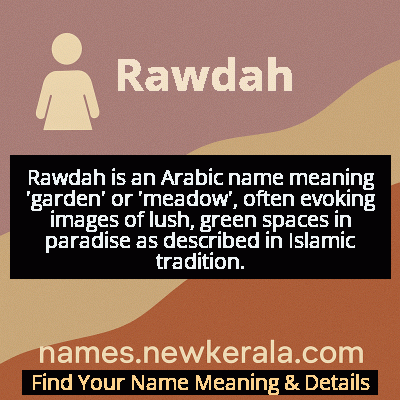Rawdah Name Meaning & Details
Origin, Popularity, Numerology Analysis & Name Meaning of Rawdah
Discover the origin, meaning, and cultural significance of the name RAWDAH. Delve into its historical roots and explore the lasting impact it has had on communities and traditions.
Name
Rawdah
Gender
Female
Origin
Muslim
Lucky Number
1
Meaning of the Name - Rawdah
Rawdah is an Arabic name meaning 'garden' or 'meadow', often evoking images of lush, green spaces in paradise as described in Islamic tradition.
Rawdah - Complete Numerology Analysis
Your Numerology Number
Based on Pythagorean Numerology System
Ruling Planet
Sun
Positive Nature
Leaders, ambitious, highly driven, self-reliant, innovative.
Negative Traits
Overly aggressive, domineering, impatient, selfish.
Lucky Colours
Red, orange, gold.
Lucky Days
Sunday.
Lucky Stones
Ruby, garnet.
Harmony Numbers
2, 3, 9.
Best Suited Professions
Entrepreneurs, managers, engineers.
What People Like About You
Courage, determination, leadership.
Famous People Named Rawdah
Rawdah Mohamed
Social Media Influencer and Content Creator
Popular Somali-Norwegian influencer known for fashion, lifestyle content, and cultural advocacy with significant online following
Rawdah Al-Haj
Medical Doctor and Health Advocate
Renowned Sudanese physician specializing in public health and women's healthcare in Middle Eastern communities
Rawdah bint Mohammed
Islamic Scholar and Educator
Influential female scholar from Saudi Arabia who established Quranic schools for women in the late 1900s
Name Variations & International Equivalents
Click on blue names to explore their detailed meanings. Gray names with will be available soon.
Cultural & Historical Significance
Beyond its specific religious reference, Rawdah embodies broader cultural values in Arab and Muslim societies. Gardens have historically represented civilization, beauty, and refuge in desert environments, making the name symbolic of oasis-like qualities—fertility, abundance, and life-sustaining beauty. In Islamic art and literature, gardens appear as metaphors for paradise, spiritual states, and idealized love. The name consequently evokes centuries of poetic tradition, from classical Arabic verse to Persian miniatures depicting lush garden scenes. This cultural resonance makes Rawdah a name that connects individual identity to collective spiritual aspirations and aesthetic ideals.
Extended Personality Analysis
Women named Rawdah typically exhibit personality traits that reflect their name's serene and nurturing connotations. They often possess a natural grace and calming presence that makes others feel comfortable and valued in their company. Like well-tended gardens, Rawdahs tend to be cultivators—whether of relationships, projects, or personal growth. They demonstrate remarkable patience and care in nurturing others, often serving as emotional anchors in their families and communities. Their connection to nature and beauty frequently manifests in artistic talents, environmental awareness, and creating harmonious living spaces.
Spiritually, Rawdahs often display deep faith and contemplative qualities, seeking meaning beyond surface appearances. They tend to be reflective individuals who value inner peace and spiritual growth, often serving as sources of wisdom and guidance for others. Despite their gentle nature, they typically possess quiet strength and resilience, able to weather life's challenges while maintaining their core values. Their combination of practical nurturing abilities and spiritual depth makes them exceptional in caregiving professions, education, community leadership, and creative fields. They excel in roles that require creating safe, beautiful environments where people and ideas can flourish.
Modern Usage & Popularity
In contemporary naming practices, Rawdah maintains a distinctive presence among Muslim families seeking names with deep religious meaning and poetic quality. While not trending dramatically upward, it enjoys consistent usage across diverse Muslim communities from the Middle East to Southeast Asia and Western diaspora populations. The name appeals particularly to parents valuing traditional Islamic heritage while preferring less common names than extremely popular choices like Aisha or Fatima. Modern usage shows interesting patterns: in Arab countries, it's often chosen by educated urban families; in Southeast Asia, it's popular among those emphasizing Arabic Islamic identity; and in Western countries, it serves as a cultural marker for Muslim immigrants. Social media has increased the name's visibility, with several women named Rawdah building significant followings as influencers, artists, and professionals. The name's elegant sound and profound meaning ensure its continued relevance, though its specific religious associations mean it remains primarily within Muslim naming traditions rather than crossing over to broader usage.
Symbolic & Spiritual Meanings
The symbolic resonance of Rawdah extends far beyond its literal meaning of garden, encompassing rich layers of spiritual and psychological significance. In Islamic mysticism, the garden represents the human heart cultivated through spiritual practice—weeded of negative traits and planted with virtues. Thus, bearing this name symbolizes the potential for spiritual transformation and inner beauty. The garden metaphor also represents the Islamic concept of creation as signs of divine wisdom, where every flower and leaf reveals aspects of the Creator's attributes. Symbolically, Rawdah embodies the idea of sacred space—both external sanctuaries for worship and internal states of peace and connection with the divine.
Metaphorically, the name suggests cyclical renewal, representing the soul's journey through seasons of growth, dormancy, and rebirth. It carries connotations of abundance without excess, beauty with purpose, and diversity within unity—all qualities celebrated in Islamic philosophy. The garden symbolism also connects to concepts of stewardship and responsibility, reminding bearers of their role as caretakers of both the natural world and their own spiritual development. Ultimately, Rawdah symbolizes the Islamic vision of ultimate fulfillment—the soul returning to its primordial state of purity and beauty, like a well-tended garden flourishing in eternal spring.

